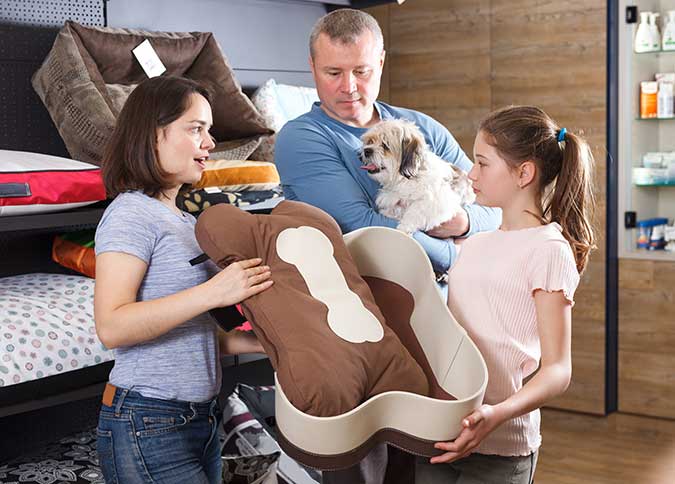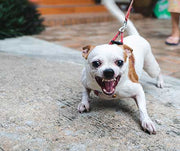Benefits of Having a Bed for Your Dog

Dogs are humans' most loyal companions and will love you unconditionally. Dogs do not care how much money you have, they don't care what you do in your free time, and they don't care what you wear. A dog's sole purpose in life is to love you for you. All that unadulterated love and affection that your dog gives you requires a lot of energy, which requires a lot of sleep. You may think putting up with you isn't that much work but there is a reason dogs sleep every chance they get and it's not because they're lazy. It's because dog work is hard work and a full-time job.
Much like when you want to go home after a long day's work and lay down in a comfortable and relaxing bed to rest before you have to get up and do it all over again the next day, so does your dog. How would you feel if you came home to sleep on an old towel or a blanket in the corner? Let's just assume you wouldn't be your normal happy and productive self.
The Importance of a Dog Bed
A dog's bed is so important for its day-to-day life. Dogs sleep anywhere from 12-14 hours a day and if they don't have the proper place to sleep, they won't be able to perform their dog duties at 100% efficiency. Just like humans, dogs – especially older dogs – require proper support and cushion in order to be healthy and active during the day. Giving your dog a bed not only provides much needed support but also helps prevent arthritis and hip dysplasia! The saying a good night's sleep does the mind and body good is as true for dogs as it is for humans.
Types of Dog Beds
There are many different types of beds that your dog can use. At Petmate, each style dog bed is designed to cater to the four main sleep positions dogs sleep in: The Side Sleeper, The Sprawl, The Donut, and the Flying Dog also known as the Superman. When choosing a bed for your dog, it's important to take into account their sleeping position. Some dogs simply curl up and sleep in that same position throughout the night while others may start out on their side and then roll over onto their back.

Your dog's sleep position can also say a lot about your dog's personality and how comfortable they are:
The Side Sleeper
- Comfortable with its surroundings
- Has a good level of trust with his surroundings for a relaxed deep sleep that allows the muscles to rest in their natural position
- Orthopedic and Lounger Dog Beds cater to the Side Sleeper position.
The Sprawl
- Dogs that sleep in this position fully trust their surroundings as this position leaves the dog in a vulnerable position.
- Regulates body temperature
- Capable of sleeping anywhere
- Lounger Dog Beds and Pillow Dog Beds cater to the Sprawl position.
The Donut
- Dogs who sleep in this position are not comfortable with their surroundings and curl up to protect themselves
- Preserves body heat
- A popular sleep position for smaller dog breeds
- Bolstered Dog Beds and Lounger Dog Beds cater to the Donut sleep position.
The Flying Dog (The Superman)
- A popular sleep position for puppies and playful dogs
- Keeps them ready to go no matter what.
- Helps regulate body temperature to cool dogs down.
- Pillow Dog Beds cater to the Flying Dog sleep position.
Things to Consider When Purchasing a Bed for Your Dog
There are a lot of different types of dog beds and picking the right one can be intimidating and sometimes overwhelming at first. Be sure to consider these things in order to purchase the best bed for your dog.
The first thing to consider is how much you are willing to spend. Dog beds can range anywhere from $10 (for smaller dogs) all the way up to $300 range. While you may be tempted to go cheap, know that you'll get what you pay for. When it comes to dog bed shopping, the more you pay the better quality bed you'll get. Cheaper dog beds are usually filled with fills that will go flat under your pet's weight while more expensive dog beds contain fills that are designed to stand up to your pet's weight. After you have your budget set, you need to start thinking about your dog's sleeping position. You'll want to pick the style bed that caters to your dog's sleep position. Once you've figured out these two things, you can start to consider the smaller details.

Material is another important thing to consider when purchasing a bed for your dog. Does your dog like to burrow before finding the perfect spot to rest? If so, look for a bed that has a loose-fitting sleep surface where the material will move around a little to cater to your dog's burrowing instinct. If you have a puppy in the teething phase, look for a chew-resistant bed.
The last thing you should consider is the material the bed is filled with. For lighter dogs, stuffed beds should be fine. Sometimes as owners, we want to get what feels most comfortable to us, but remember we are not the ones sleeping on it. So a firm dog bed for a small dog that won't even be able to make a dent in the foam because it's so light would be no different than him sleeping on the hard floor.
A larger, heavier dog will need more support with thicker padding. A bed padded with orthopedic foam is the go-to for larger dogs. An orthopedic dog bed may sound a bit excessive in thought, but in reality, your dog spends more than half the day laying on its bed so providing proper support will help preserve joints, keep them healthy, and could end up saving you massive amounts of money on surgery and treatment later in your dog's life. The best medicine is preventative medicine, even when it comes to our pets.
Cost Vs. Quality
Remember when it comes to cost vs. quality for your dog's bed, try and choose quality. The more you spend on your dog's bed, the better quality bed you will get and the less you'll spend on replacing it.
Conclusion
Who would have known buying a bed for your dog would be such a complicated and in-depth process? We did! That's why we offer dog bedding for any type of sleeper no matter their size. Happy shopping!
Previous article

Next article

Related posts
View all-

How to Keep Your Pet Calm During Thanksgiving
Thanksgiving is a time for family, friends, and food, but for our pets, the holiday can be overwhelming. The sudden change in routine, unfamiliar faces and scents, and increased noise can trigger significant stress. Understanding why your pet might feel anxious is the first step toward creating a peaceful holiday experience for everyone, including your furry family members. This guide offers calming tips for pets and practical solutions to ensure your dog or cat feels safe and secure during the festivities.
Read Article -

Top Travel Essentials for Pets This Holiday Season
Holiday travel often means bringing the whole family along, and for many of us, that includes our furry companions. Preparing for holiday pet travel is about more than just packing a bag; it's about ensuring your pet's safety, comfort, and happiness from the moment you leave home until you return. A little planning helps reduce stress for both you and your pet, making the journey a positive experience for everyone involved.
Read Article -

Best Leashes and Collars for Daily Walks: A Pet Parent’s Guide
A daily walk with your dog isn't just a chore—it's a chance to bond, explore, and stay active together. The right leash and collar can make every walk safer and more enjoyable for both of you. With numerous styles and materials available, it's essential to find gear that suits your dog's needs and your lifestyle.
Read Article



